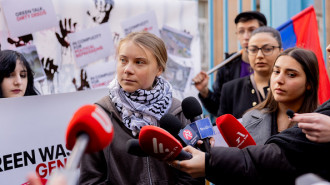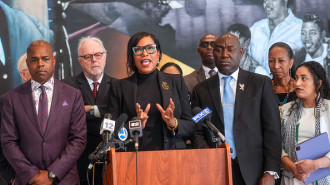Israel confirms holding body of slain Palestinian as controversial 'necroviolence' policy continues
The Israeli army said on Friday it was holding the body of a Palestinian shot dead in the West Bank earlier this week, ending days of uncertainty over his fate.
The announcement follows a policy change last month in which Israel said it would not return the bodies of any Palestinian killed during or as a result of a suspected attack.
On Monday, 27-year-old Palestinian Samir Hamidi was killed by Israeli soldiers near the northern West Bank settlement of Einav after reportedly throwing petrol bombs.
"Troops spotted three assailants who hurled Molotov cocktails at them," the army said on Friday.
"The troops responded with fire and a hit of one of the assailants was identified," the army added.
In an initial statement on Monday, the army had not mentioned Hamidi was killed, but his death was then reported by Palestinian media. On Friday, the army named him.
"The body of the terrorist is being held by the IDF (Israel Defence Forces) according to existing procedures, until a decision is made in accordance with the guidance from elected officials on the issue of holding the bodies of terrorists," the army statement added.
|
||
The family of Hamidi, from the village of Beit Lid, close to the Israeli settlement at Einav, have refused to receive condolence visits until his body is returned.
Security coordination between Israel and the Palestinian Authority has been at a standstill since May, in protest over Israeli plans to annex parts of the West Bank, a move since suspended.
Palestinian government spokesman Ibrahim Melhem told AFP that in "the absence of any coordination", they were told of Hamidi's death by the International Committee of the Red Cross.
In early September, Israel said it would withhold the bodies of all slain suspected Palestinians militants.
Prior to the decision, Israel retained only the bodies of militants from Hamas, the Islamist rulers of Gaza.
At the time, Defence Minister Benny Gantz said the policy change was part of a broader campaign of "deterrence".
Analysts have described the policy as "necroviolence", an act intended to humiliate a dead human body.
“We see it as an extension of an entire policy designed by Israel to control bodies of Palestinians,” Budour Hassan, a legal researcher with the Jerusalem Legal Aid and Human Rights Center (JLAC), said of the policy in an interview with Aljazeera earlier this year.
Follow us on Facebook, Twitter and Instagram to stay connected







 Follow the Middle East's top stories in English at The New Arab on Google News
Follow the Middle East's top stories in English at The New Arab on Google News


